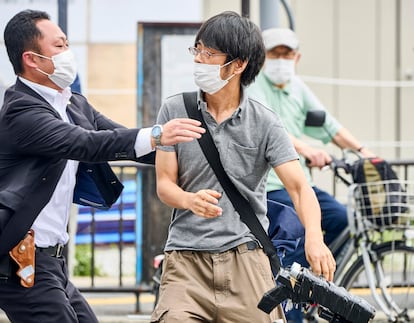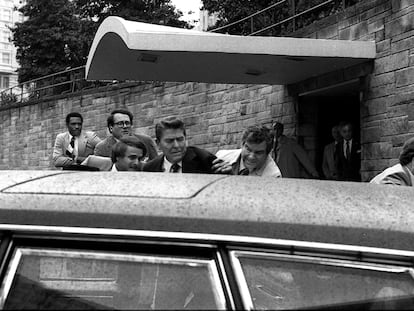Japan’s ex-PM Shinzo Abe dies in hospital after being shot by gunman
The conservative politician went in cardiopulmonary arrest after collapsing at a campaign rally in the city of Nara. A suspect has been detained

Former Japanese Prime Minister Shinzo Abe, 67, died in the hospital after being shot on Friday morning at a campaign rally in the city of Nara, near Kyoto. He was rushed into emergency care after collapsing to the ground and going into cardiopulmonary arrest, according to Kyodo news agency.
Local authorities said that Abe had sustained gunshot wounds to his neck and chest. The suspected attacker has been arrested, according to the Japanese state broadcaster NHK. The man has been identified as Tetsuya Yamagami, 41, a resident of Nara who was described as unemployed. According to NHK, the attacker shot Abe twice in the back with what appeared to be a homemade weapon. Police said he has admitted to the assassination.
“Abe was bleeding profusely and we were unable to save his life,” said a doctor at the hospital. The bullet was “deep enough to reach his heart,” said doctors at Nara Medical University in a news conference.

On Friday morning, the former leader was giving a campaign speech on behalf of Kei Sato, a member of the Upper House who is running for re-election. Shortly after he began talking, at around 11.30 am local time, attendees heard the sound of what seemed to be at least two shots and saw Abe collapse.
Abe was the longest-serving prime minister of Japan, heading two governments from 2006 to 2007 and from 2012 to 2020, before stepping down for health reasons. Despite formally retiring, he still held immense influence in Japanese politics, dominated by his Liberal Democratic Party (LDP), which led the country for most of the postwar era. After leaving the government, he was replaced by his spokesman and cabinet secretary Yoshihide Sugawara, who in turn resigned last year and was replaced by the current prime minister, Fumio Kishida.
Kishida on Friday described Abe’s assassination as “an act of cowardly barbarism.”
Abenomics
During his eight years in office, Abe tried to boost Japan’s economy, stagnant since the 1990s, with a method informally dubbed “Abenomics” and based on fiscal spending and loose monetary policy.
Considered a “hawk” in foreign policy, the former prime minister boosted defense spending and in 2014 his government approved a reinterpretation of the postwar pacifist Constitution to allow Japanese troops to fight outside national territory for the first time since the end of World War II.
He was one of the great promoters of Tokyo’s candidacy for the 2020 Olympic Games. His dream of presiding over the celebrations was frustrated by the outbreak of the Covid pandemic, which forced the event to be postponed for a year.
Tu suscripción se está usando en otro dispositivo
¿Quieres añadir otro usuario a tu suscripción?
Si continúas leyendo en este dispositivo, no se podrá leer en el otro.
FlechaTu suscripción se está usando en otro dispositivo y solo puedes acceder a EL PAÍS desde un dispositivo a la vez.
Si quieres compartir tu cuenta, cambia tu suscripción a la modalidad Premium, así podrás añadir otro usuario. Cada uno accederá con su propia cuenta de email, lo que os permitirá personalizar vuestra experiencia en EL PAÍS.
¿Tienes una suscripción de empresa? Accede aquí para contratar más cuentas.
En el caso de no saber quién está usando tu cuenta, te recomendamos cambiar tu contraseña aquí.
Si decides continuar compartiendo tu cuenta, este mensaje se mostrará en tu dispositivo y en el de la otra persona que está usando tu cuenta de forma indefinida, afectando a tu experiencia de lectura. Puedes consultar aquí los términos y condiciones de la suscripción digital.
More information
Últimas noticias
Venezuelan exiles in Madrid scramble to salvage Christmas plans after flight cancellations
Russian ultranationalism, inflamed by the killing of the hooligan commander ‘Spaniard’
The relentless struggle between factions deepens the Sinaloa war: bodies in coolers and a surge in homicides
‘Doctor Death’, the journalist who has witnessed 105 executions in Florida
Most viewed
- The low-cost creative revolution: How technology is making art accessible to everyone
- Christian Louboutin: ‘Young people don’t want to be like their parents. And if their parents wear sneakers, they’re going to look for something else’
- All the effects of gentrification in one corner of Mexico’s Colonia Roma
- Liset Menéndez de la Prida, neuroscientist: ‘It’s not normal to constantly seek pleasure; it’s important to be bored, to be calm’
- Christmas loses its festive spirit: ICE fears cast shadow over religious celebrations










































